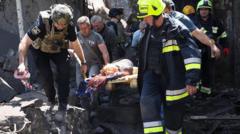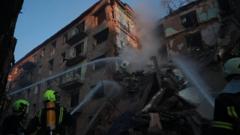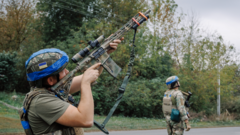As NATO leaders gather in The Hague, German Chancellor Friedrich Merz reaffirmed Berlin's commitment to the alliance, promising that Germany would pay its fair share for European defense. This comes amid a pressing call for enhanced military investment in light of ongoing conflicts.
Germany Commits to Strengthening Europe’s Defense at NATO Summit in The Hague

Germany Commits to Strengthening Europe’s Defense at NATO Summit in The Hague
Germany's Chancellor emphasizes the need for strong military investment amid rising tensions with Russia.
In a statement to Germany's parliament, Merz underscored the importance of a robust response to Russian aggression, indicating that President Putin only respects strength. The NATO summit, marking President Trump's first since 2019, is seen as pivotal for future European peace.
With a goal of allocating 3.5% of national GDP to defense spending, as well as an additional 1.5% for related infrastructure, NATO allies are seeking greater commitment. Merz reiterated that the purpose of increased defense spending is to bolster security throughout the Euro-Atlantic region, not merely as a gesture to the U.S.
The summit occurs in the shadow of escalating conflicts, including recent Russian missile strikes in Ukraine that resulted in civilian casualties. With ten deaths reported from the attacks, the urgency for NATO support for Ukraine is higher than ever. Ukrainian President Volodymyr Zelensky is also in attendance, set to meet with Trump for their first discussion since the Pope's funeral in April.
Despite disparities in defense expenditure among NATO member states, a major new investment plan aims to raise baseline defense spending to 5% of GDP, although many countries currently fall short of the existing 2% guideline. The German government is committed to achieving a target of 3.5% by 2029, with a defense budget projected to increase significantly by then.
Merz is expected to engage with leaders such as UK Prime Minister Sir Keir Starmer and French President Emmanuel Macron during the summit, which has been condensed to accommodate the schedules of key attendees. The commitment from NATO countries now hinges on a carefully worded statement, which must balance the varying defense capabilities and economic realities of member states.
While skepticism exists regarding the feasibility of meeting these ambitious spending goals, all NATO members are anticipated to endorse the new pledge. However, Spain has voiced concerns about meeting the target, with Prime Minister Pedro Sánchez seeking an exemption that has been resisted by NATO officials.
As heads of state arrive for the summit, logistical challenges have arisen, with travel disruptions reported after fire damage in the region. Security ministers are investigating possible sabotage, reflecting the heightened tensions surrounding the meeting.
With the potential for historic decisions at this NATO summit, the alliance's future and its response to external threats are front and center as discussions proceed.
With a goal of allocating 3.5% of national GDP to defense spending, as well as an additional 1.5% for related infrastructure, NATO allies are seeking greater commitment. Merz reiterated that the purpose of increased defense spending is to bolster security throughout the Euro-Atlantic region, not merely as a gesture to the U.S.
The summit occurs in the shadow of escalating conflicts, including recent Russian missile strikes in Ukraine that resulted in civilian casualties. With ten deaths reported from the attacks, the urgency for NATO support for Ukraine is higher than ever. Ukrainian President Volodymyr Zelensky is also in attendance, set to meet with Trump for their first discussion since the Pope's funeral in April.
Despite disparities in defense expenditure among NATO member states, a major new investment plan aims to raise baseline defense spending to 5% of GDP, although many countries currently fall short of the existing 2% guideline. The German government is committed to achieving a target of 3.5% by 2029, with a defense budget projected to increase significantly by then.
Merz is expected to engage with leaders such as UK Prime Minister Sir Keir Starmer and French President Emmanuel Macron during the summit, which has been condensed to accommodate the schedules of key attendees. The commitment from NATO countries now hinges on a carefully worded statement, which must balance the varying defense capabilities and economic realities of member states.
While skepticism exists regarding the feasibility of meeting these ambitious spending goals, all NATO members are anticipated to endorse the new pledge. However, Spain has voiced concerns about meeting the target, with Prime Minister Pedro Sánchez seeking an exemption that has been resisted by NATO officials.
As heads of state arrive for the summit, logistical challenges have arisen, with travel disruptions reported after fire damage in the region. Security ministers are investigating possible sabotage, reflecting the heightened tensions surrounding the meeting.
With the potential for historic decisions at this NATO summit, the alliance's future and its response to external threats are front and center as discussions proceed.





















